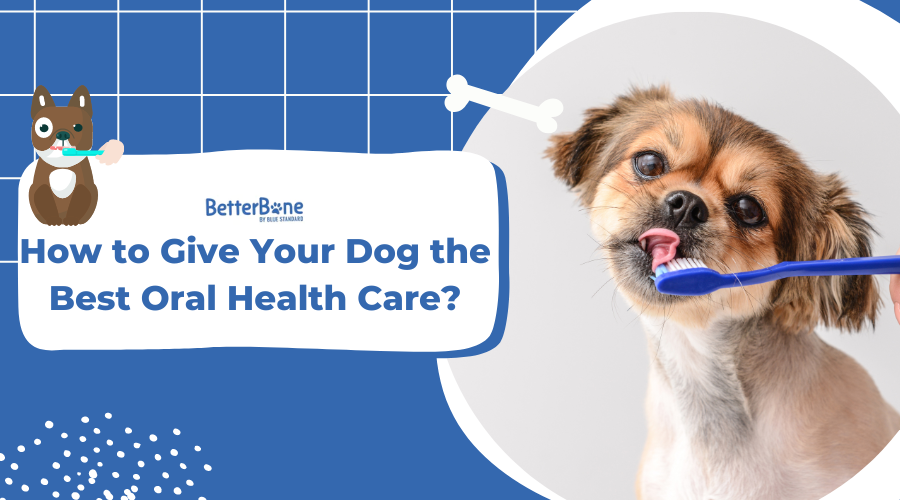Dogs are man's best friend and deserve all the love and care we can give them. As dog owners, we want our pets to be happy and healthy, but often, their oral hygiene goes overlooked. Like humans, dogs require proper oral care to maintain their overall health and prevent serious health issues such as periodontal disease, kidney and heart problems.
As a responsible pet owner, it is essential to prioritize your dog's dental health.
This blog post will outline the ultimate guide to providing your precious dog with the best oral health care.
Why is it important to give your dog oral health care?

Neglecting your dog's oral care can lead to serious health issues and not to mention downright stinky breath. Let's discuss why giving your dog oral health care is important and the signs to look out for.
#1 Prevents dental diseases and infections
Like humans, dogs can suffer from dental problems such as cavities, gum disease, and conditions. Without proper oral health care, bacteria can build up in your dog's mouth, leading to painful and costly procedures.
#2 Improves overall health
Your dog's oral health can affect its well-being. Bacteria from gum disease can travel through the bloodstream and potentially cause infections in other body parts, such as the heart, liver, and kidneys.
By keeping your dog's teeth clean and healthy, you can help prevent these issues from occurring.
#3 Increases the bond between you and your dog
Bonding with your dog during brushing sessions can be a great way to strengthen your relationship with them. It's an opportunity for one-on-one time and can help establish trust between you and your furry companion.
#4 Saves you money
Neglecting your dog's oral health can lead to costly procedures like root canals or extractions. You can save money in the long run by practicing good oral hygiene with your dog.
The ultimate guide to giving your dog the best oral health care
#1 Use dental chews and treats
Dental chews and treats keep your dog's mouth busy and are an excellent way to combat plaque and tartar buildup. Look for dental chews like the Betterbone Classic. It is made from two all-natural and 100% sustainable ingredients, and the BetterBone helps promote dental hygiene through our unique trident-shaped design while being non-toxic, hypoallergenic, and non-splintering.
#2 Brushing your dog’s teeth
The easiest way to prevent dental problems in your dog is by brushing their teeth regularly. Dogs can be trained to accept this activity if introduced early and rewarded. Use a specially designed toothbrush and toothpaste that is safe for dogs, as human toothpaste is unsuitable due to its high fluoride content.
This is important to remember, as fluoride can harm your dog if swallowed. Make sure to use gentle circular motions and focus along the gum line. Start by doing small brushing sessions through regular interaction with your dog so they become comfortable with the process.
You can gradually increase this to daily brushing as they get older. Reward your pet for their cooperation with treats or other rewards.
#3 Schedule regular vet checkups
Regular vet checkups are essential to maintaining your dog's oral hygiene, just like humans. During checkups, your vet will examine your dog's teeth and gums.
If necessary, they will recommend professional teeth cleaning or other dental treatments.
#4 Maintain a healthy diet
A healthy diet is an essential part of your dog's overall health. A well-balanced diet can help keep dental disease at bay. Wet or canned food should be avoided as it contains high amounts of sugar. This can lead to tartar buildup on your dog's teeth. Instead, consider food made to keep your dog's teeth healthy and strong, available in most pet stores.
You can also choose fresh fruits and vegetables to maintain good dental hygiene. Give them an apple, carrot, or regular chews that you can buy from supermarkets.
#5 Observe any signs of dental problems
Knowing any signs of dental problems in your dog is essential for a pet owner.
These signs include bad breath, drooling, swollen gums, bleeding, and yellow or brown teeth. You should schedule a vet appointment immediately if you notice these symptoms.
Let’s be responsible pet owners!

Prioritizing your dog's oral health is integral to being a responsible and caring pet owner. By implementing the tips and tricks we've discussed, you can significantly impact your dog's overall well-being.
It's crucial to remember that prevention is always better than cure regarding oral health. Taking a proactive approach and dedicating a small investment of time and effort now can save your furry friend from unnecessary pain and discomfort in the future.
So, let's commit to giving our dogs the best oral health care possible. Your furry friend will thank you for it, and you can enjoy the satisfaction of knowing you're doing everything you can to keep them happy and healthy.










